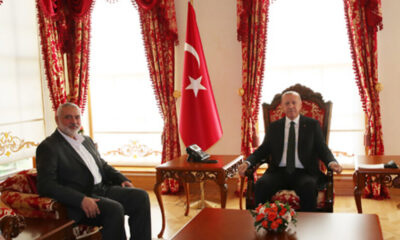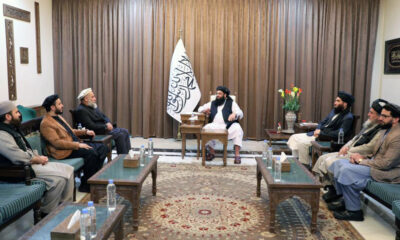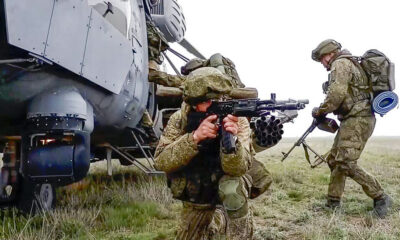World
Zelenskiy arrives in Japan’s Hiroshima for ‘talks with friends’

Ukraine’s President Volodymyr Zelenskiy arrived in the Japanese city of Hiroshima on Saturday to meet leaders of the world’s richest democracies and drum up support for the defense against Russia’s invasion of his country.
Zelenskiy’s presence at the Group of Seven summit in a city that was the first to suffer a nuclear attack cast into sharp relief western governments’ concerns over the nuclear threat posed by Russia, Reuters reported.
The Hiroshima summit comes as G7 members are faced with the immense challenges posed by Russia’s invasion of Ukraine and tensions with China, notably over Taiwan.
Zelenskiy, wearing his customary olive green fatigues, stepped out of a French government aircraft and moved quickly to a waiting car, footage from Japanese broadcasters showed.
Moments later he tweeted: “Japan. G7. Important meetings with partners and friends of Ukraine.”
His arrival comes after G7 members warned that countries attempting to use trade as a weapon would face “consequences”, sending a strong signal to China over practices Washington has long said amount to economic bullying.
French and European officials said it was crucial that Zelenskiy came in person first to the Arab League and now to the G7, where members of the Global South are attending, in order to outline Ukraine’s view as the victim of an attack by Russia and how he saw a peace settlement in the future.
“We have to use all the means to bind non-aligned states to the cause of the defense of the sovereignty and territorial integrity of Ukraine,” a French presidential official told reporters.
Zelenskiy will hold bilateral meetings with G7 leaders, but significantly also the leaders of India and Brazil, two countries that have not distanced themselves from Moscow.
He is due to hold a session on Sunday with the G7 before a broader session with the Global South attendees.
World
EU leaders back new Iran sanctions after attack on Israel

European Union leaders decided on Wednesday to step up sanctions against Iran after Tehran’s missile and drone attack on Israel left world powers scrambling to prevent a wider conflict in the Middle East, Reuters reported.
The summit in Brussels is the first meeting of the EU’s 27 national leaders since Saturday’s attack, more than six months into the war between Israel and the Iran-backed Palestinian militant group Hamas.
Israel has signalled it will retaliate but has not said how. EU leaders condemned the Iranian attack, reaffirmed their commitment to Israel’s security and called on all sides to prevent more tensions, including in Lebanon.
“We feel it’s very important to do everything to isolate Iran,” said summit chairman Charles Michel, adding the new sanctions against the Islamic Republic would target companies involved in the production of drones and missiles.
German Chancellor Olaf Scholz said it was important that Israel “does not respond with a massive attack of its own.”
Italy spoke separately ahead of G7 talks in favour of sanctions against arms suppliers linked to the attack against Israel, as well as those behind attacks on ships in the Red Sea, read the report.
Iran launched its assault in response to an April 1 strike on its embassy in Damascus which it blamed on Israel. Tel Aviv started its broader military offensive in Gaza after Hamas’ deadly attack on Israel on Oct. 7.
ISRAEL AND UKRAINE
EU foreign ministers are due to continue the sanctions work on Monday as the United States and its Western allies hope new steps against Iran will help limit any Israeli retaliation.
The EU already has multiple programmes that target Iran for human rights abuses, the proliferation of weapons of mass destruction, and Tehran’s support for Russia’s war in Ukraine, Reuters reported.
Germany, France and several EU states are looking at expanding a scheme that seeks to curb the supply of Iranian drones to Russia to include the provision of missiles and cover deliveries to Iranian proxies in the Middle East.
Belgium backed introducing sanctions against Iran’s Revolutionary Guard Corps but Scholz said that required further legal checks. The bloc’s top diplomat has said that could only happen if a national authority in the EU found that the group had been involved in terrorist activity.
Analysts say Iran is unlikely to face more severe economic punishment because of worries about boosting oil prices and angering top buyer China.
With the Middle East capturing much of the EU’s attention, Ukraine’s President Volodymyr Zelenskiy appealed for more help in holding the line against Russia, which unleashed an invasion against its neighbour more than two years ago, read the report.
“Here in Ukraine, in our part of Europe, unfortunately, we do not have the level of defence that we all saw in the Middle East a few days ago,” Zelenskiy told the summit, after Israel and allies mostly shot down the incoming drones and missiles.
“It reflects our current key need – the need for air defence,” he said, according to an EU official, repeating his calls for speedier deliveries of the weapons and ammunition previously promised to Ukraine.
World
US and allies plan more Iran sanctions; Israel war cabinet to meet again
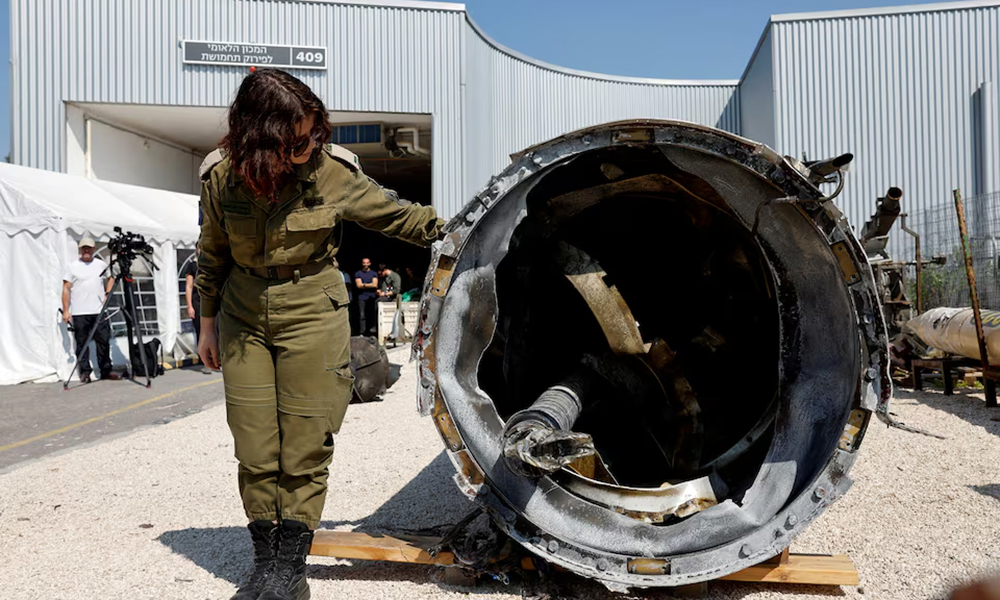
The U.S. and its allies planned fresh sanctions against Iran over its unprecedented attack on Israel, seeking to dissuade Israel from a major escalation as its war cabinet was set to meet for a third time on Wednesday to decide a response, Reuters reported.
While Saturday night’s attack caused no deaths and little damage thanks to the air defences and countermeasures of Israel and its allies, it has increased fears that violence rooted in the six-month-old Gaza war is spreading, with the risk of open war between long-time adversaries Iran and Israel.
Israel’s military chief of staff Herzi Halevi had promised Iran’s launch of more than 300 missiles, cruise missiles and drones at Israeli territory “will be met with a response”, but gave no details.
An Israeli government source said the war cabinet session scheduled for Tuesday had been put off until Wednesday, without elaborating, read the report.
Hoping to steer Israel away from massive retaliation, the U.S. and Europe flagged a toughening of economic and political sanctions against Iran.
The U.S. is planning to impose new sanctions targeting Iran’s missile and drone programme in the coming days and expects its allies will be following suit, National Security Advisor Jake Sullivan said in a statement on Tuesday.
Earlier, Treasury Secretary Janet Yellen said the U.S. would use sanctions, and work with allies, to keep disrupting Iran’s “malign and destabilising activity”.
She told a news conference in Washington all options to disrupt Iran’s “terrorist financing” were on the table, and she expected further sanctions against Iran to be announced soon.
European Union foreign policy chief Josep Borrell, speaking in Brussels after an emergency video conference of EU foreign ministers, said some member states had asked for sanctions against Iran to be expanded and that the bloc’s diplomatic service would begin working on the proposal.
Borrell said the proposal would expand a sanctions regime that seeks to curb the supply of Iranian drones to Russia so that it would also include the provision of missiles and could also cover deliveries to Iranian proxies in the Middle East.
Israeli Foreign Minister Israel Katz said he was “leading a diplomatic attack”, writing to 32 countries to ask them to place sanctions on Iran’s missile programme and follow Washington in proscribing its dominant military force, the Revolutionary Guard Corps, as a terrorist group, Reuters reported.
‘CALM HEADS’
Iran launched the attack in retaliation for an airstrike on its embassy compound in Damascus on April 1 attributed to Israel, but has signalled that it now deems the matter closed.
President Joe Biden told Israeli Prime Minister Benjamin Netanyahu at the weekend that the United States, Israel’s main protector, would not participate in an Israeli counter-strike.
British Prime Minister Rishi Sunak told Netanyahu in a call on Tuesday that escalation in the Middle East was in nobody’s interest and would only worsen insecurity in the region, so it was “a moment for calm heads to prevail”, Sunak’s office said.
Japan Foreign Minister Yoko Kamikawa “strongly urged Israel to exercise restraint” during a call with her Israeli counterpart Israel Kantz on Tuesday evening, according to a readout of the call issued by Japan’s foreign ministry.
The prospect of Israeli retaliation has alarmed many Iranians already enduring economic pain and tighter social and political controls since major protests in 2022-23, read the report.
Since the war in Gaza began in October, clashes have erupted between Israel and Iran-aligned groups based in Lebanon, Syria, Yemen and Iraq.
Israel said four of its soldiers were wounded hundreds of metres inside Lebanese territory overnight, the first known Israeli ground penetration into Lebanon since the Gaza war erupted, although it has regularly traded fire with the heavily armed Lebanese Hezbollah militia.
In Gaza itself, where more than 33,000 Palestinians have been killed in the Israeli offensive according to Gaza health ministry figures, Iran’s action drew applause.
Israel began its campaign against Hamas, the Iranian-backed Palestinian militant group that runs Gaza, after the militants attacked Israel on Oct. 7, killing 1,200 people and taking 253 hostages, by Israeli tallies.
World
Israeli military vows response to Iran attack as calls for restraint mount
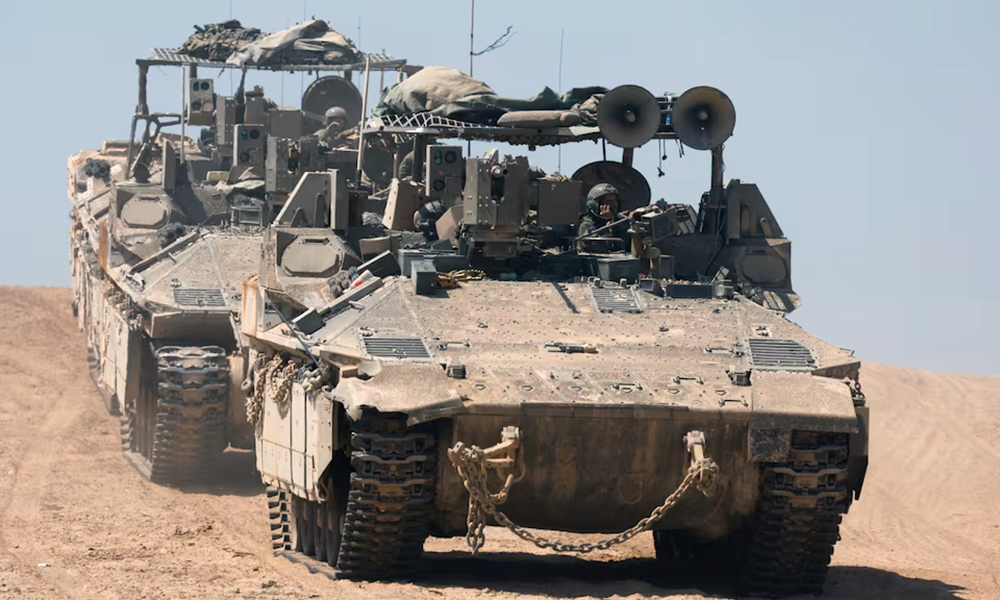
Israelis awaited word this week on how Prime Minister Benjamin Netanyahu would respond to Iran’s first-ever direct attack as international pressure for restraint grew amid fears of an escalation of the conflict in the Middle East.
Netanyahu on Monday summoned his war cabinet for the second time in less than 24 hours to weigh a response to Iran’s weekend missile and drone attack, a government source told Reuters.
Military Chief of Staff Herzi Halevi said Israel would respond. He provided no details.
“This launch of so many missiles, cruise missiles, and drones into Israeli territory will be met with a response,” he said at the Nevatim Air Base in southern Israel, which sustained some damage in Saturday night’s attack.
The prospect of Israeli retaliation has alarmed many Iranians already enduring economic pain and tighter social and political controls since protests in 2022-23.
Iran launched the attack in retaliation for what it says was an April 1 Israeli airstrike on its embassy compound in Damascus, and signaled that it does not seek further escalation, Reuters reported.
While the attack caused no deaths and limited damage, it has increased fears of open warfare between the long-time foes and fuelled concerns that violence rooted in the Gaza war is spreading.
U.S. President Joe Biden told Netanyahu at the weekend that the United States, which helped Israel blunt the Iranian attack, will not participate in an Israeli counter-strike.
Iran’s response
The Iranian Army Chief Commander Major General Abdolrahim Mousavi said on Monday however that Iran will not hesitate to give a “stormy and unified” response to any act of aggression against it.
In a message marking the National Army Day, Mousavi said great defensive measures of the country’s Army and Armed Forces have resulted in strong deterrent power.
According to him, Iran will respond to any aggression against the country’s national interests, borders and security, Iran’s Press TV reported.
Mousavi emphasized that the retaliatory strikes, dubbed Operation True Promise, revealed only a part of the capacity and strong will of the Iranian Armed Forces and were carried out in cooperation among the Islamic Revolution Guards Corps (IRGC) Aerospace Division, the Army, and the Defense Ministry.
Press TV reported that the Israeli airstrikes on Iran’s embassy compound in Damascus killed two generals of Iran’s Islamic Revolution Guards Corps (IRGC), Brigadier General Mohammad Reza Zahedi and General Mohammad Hadi Haji Rahimi, as well as five officers.
In response, on Saturday night, the IRGC targeted Israel with a barrage of drones and missiles. The extent of the damage on Israeli military bases is yet to be specified.
Following the reprisal, Iran warned Israel against taking any retaliatory actions and also urged the US to try not to involve itself in the conflict and signaled that it viewed the matter as “concluded.”
-

 Sport4 days ago
Sport4 days agoACL draw to be broadcast live on ATN channels
-

 Business5 days ago
Business5 days agoAfghanistan reaches self-sufficiency in production of 133 items: MoIC
-

 Regional4 days ago
Regional4 days agoIRGC chief warns of harsher response if Israel attacks Iran
-

 Health5 days ago
Health5 days agoMajority of Afghans with mental disorders are women: officials
-
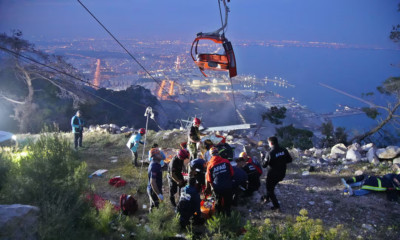
 World5 days ago
World5 days agoOne killed, 10 injured in cable car accident in southern Turkey
-
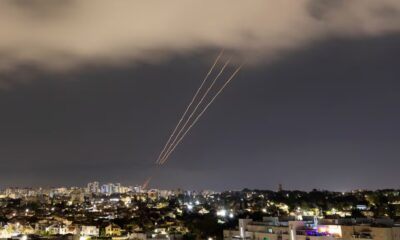
 Regional4 days ago
Regional4 days agoIran launches retaliatory attack on Israel with hundreds of drones, missiles
-

 Sport3 days ago
Sport3 days agoACL fever grows as fixtures finalized
-

 Latest News4 days ago
Latest News4 days agoContact group on Afghanistan hits roadblock over Pakistan’s gripe with India




